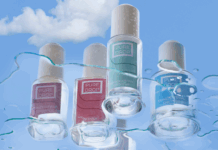Shiseido Company, Limited (Shiseido), Sekisui Chemical Co, Ltd (Sekisui Chemical) and Sumitomo Chemical Co, Ltd (Sumitomo Chemical) are to launch a joint initiative to establish a circular economy for plastic cosmetic containers, in which used plastic cosmetic containers are collected, converted into resources and materials without sorting, and recycled into plastic cosmetic containers.
Cosmetics containers are made from a wide variety of plastics, as emphasis is placed on content protection, ease of use and design. As a result, it's difficult to sort cosmetics containers for recycling, making it a major challenge to recycle them into plastic resources. To solve this problem, Shiseido, Sekisui Chemical and Sumitomo Chemical have agreed to collaborate in setting up a new system for collecting used plastic cosmetic containers and recycling them into new cosmetic containers, drawing on their respective expertise.
Shiseido will implement a new collection system for plastic cosmetic containers in retail stores, and use recycled polyolefin (1) for its cosmetic containers. Sekisui Chemical will use BR ethanol (2) technology to convert used plastics into ethanol, a raw material for plastics, by turning combustible waste into gas without sorting it, and converting the gas into ethanol using microbes. At the same time, Sumitomo Chemical will manufacture ethylene (3) from this ethanol using renewable ethanol-to-ethylene technology, and produce polyolefin products from the ethylene of equivalent quality to conventional polyolefins using fossil resources.
The three companies will drive this cross-sector alliance forward, while calling on related industries and businesses to join the effort, and strive to create a circular economy.
(1) Polyolefin: Generic term for certain types of plastic (synthetic resins), such as polyethylene and polypropylene.
(2) BR ethanol technology: A technology that gasifies combustible waste accumulated in unsorted waste disposal facilities and converts the gas into ethanol using microbes without the application of heat or pressure. BR stands for biorefinery.
(3) Ethylene: A raw material for synthetic resins such as polyethylene and for organic compounds.








